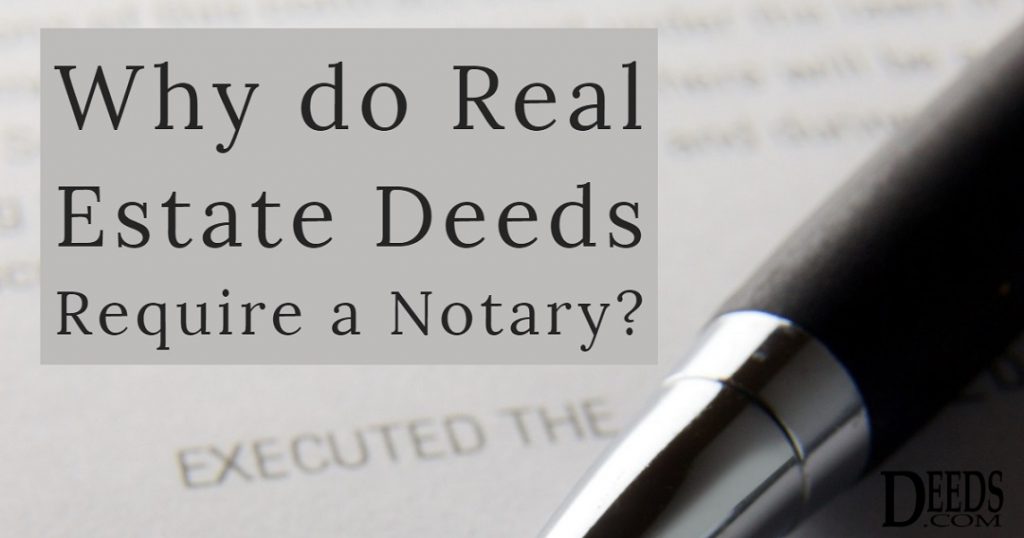
A notary’s acknowledgement is vital to the integrity of the residential property deed. Why?
The real estate deed is a formal
instrument. It must verify the grantor’s interest in, and right to convey, the property. It must protect the interest transferred to the grantee. Notarization gives the deed a strong presumption of validity relative to other types of property documents. The careful stewardship applied to a home deed helps keep a clear chronicle of ownership and preserve the chain of title. Without such care, a bona fide purchaser might one day be forced to confront claims by others who believe they hold interests in the same real estate.
Here, we outline a notary’s job, and how it becomes an integral element of a real estate transaction.
The Notary’s Job
A Notary Public is a public official, acting in the role of an unbiased witness. The notary verifies that people who execute documents are who they claim to be, and that the documents are legitimate. In the colonial Americas, notaries served as indispensable witnesses for Europeans staking their property claims. In a striking example, Ferdinand and Isabella of Spain had the notary Rodrigo de Escobedo witness and document the 1492 landing by Columbus on San Salvador Island.
Today’s notaries have the responsibilities and authority that their state confers on them. (The District of Columbia, of course, also has notaries. They’re appointed by the D.C. mayor.)
An example of the job description is published by the Florida Governor’s Office, which defines a notary public as a public officer, appointed and commissioned by the Governor to:
- Administer oaths;
- Take acknowledgments of legal documents, including real property deeds;
- Certify or attest to the validity of copies of documents; and
- Perform other certification duties outlined by Florida law.
The notary is the person who makes sure signatures are witnessed if necessary. By following all the assigned duties, the notary plays a fraud-deterring role in a real estate conveyance. The notary is empowered to put the executor under oath in order to verify a legal instrument’s claims and statements. Thus, a notary’s seal assures the public that the person who signed the document was properly identified, and that the document carries the force of the law.
New Directions: Electronic Transactions
Under its version of the Uniform Electronic Transaction Act, Florida requires no additional appointment for a Florida notary public to carry out electronic notarizations.
The state allows electronic documeints and electronic signatures, including notaries’ signatures, in the creation of recordable real estate documents. This aligns Florida with the growing number of states adopting:
- The Uniform Electronic Transactions Act, which allows electronic signing of documents. Note that the Act provides for state-specific rules governing the filing of real estate paperwork.
- The Electronic Notary Public Act, adopted by a number of states to permit electronic notarization.
For more on electronic notarization, electronic witnessing, and the special concerns raised by remote online notarization (as opposed to eNotarization), see the Deeds.com analysis.
Special Rules: Witnessing
Before recording their transaction, the buyer and seller sign the property deed with a notary public. Five states require the signature to have witnesses. If the signing occurs in another state, the witness rules are dictated by the state where the property is.
Among the five states that require witnesses to the notarization is Florida—which requires two. The notary may act as one of the witnesses. Note that Florida only requires the two witnesses for deeds that convey property. A mortgage agreement does not require a notary, though some lenders request it. That said, deeds, mortgage agreements, and all documentation related to property records in Florida must adhere to Florida’s recording statute.
Other states that require witnesses to the deed notarization are Georgia, which requires one witness who is not the notary; Louisiana, which requires two witnesses who are not the notary; South Carolina, which requires two witnesses and allows the notary to act as one of the witnesses; and Connecticut, which also requires two witnesses and allows the notary to be one of them.
The witnesses to a signature need not be identified; nor must their signatures be notarized.
Most notaries will not volunteer to serve as a witness to the signing, even where they are permitted to do so. Notaries know the additional witness to a signature might be useful later, should the transaction ever be challenged.
Notaries vs. Fraud
Proper, careful notarizations help preserve good property records, and ward off deed fraud. An encounter with a fraudster could happen to any notary. Some criminals use false identification to trick notaries. Other wrongdoers might try to persuade a notary to validate the document without the signer being present. Many frauds are conjured up by a homeowner’s family member, spouse, or caregiver. There are even cases of falsified notarial seals, and fake seals sold online.
Scams can, and often do, go undetected until a homeowner dies and the heirs find out they have lost their inheritance. Few legal tangles are as hard to undo as a fraudulent real estate conveyance.
As Michael Lewis wrote for the National Notary Association, notaries should look for issues with the signer’s identification. They should keep a notary journal with details of all notarial interactions, to demonstrate the integrity of the notarization (or to help law enforcement) should issues come to light later, and to demonstrate their application of reasonable care.
